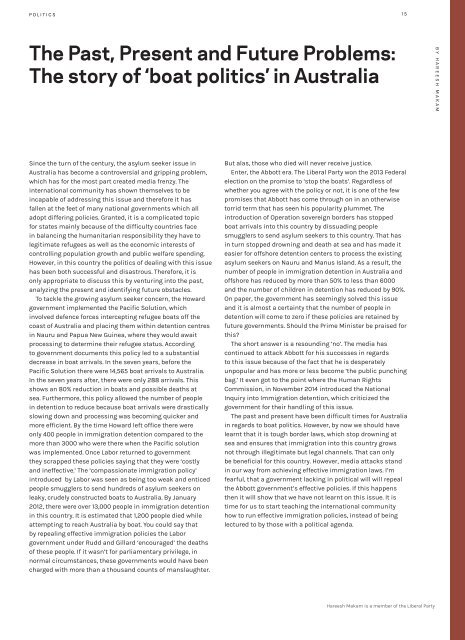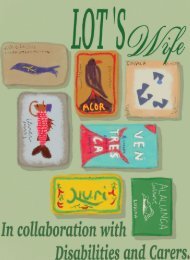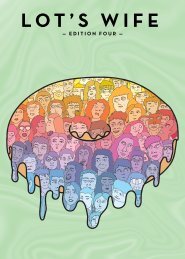Lot's Wife Edition 6 2015
You also want an ePaper? Increase the reach of your titles
YUMPU automatically turns print PDFs into web optimized ePapers that Google loves.
POLITICS 15<br />
The Past, Present and Future Problems:<br />
The story of ‘boat politics’ in Australia<br />
BY HAREESH MAKAM<br />
Since the turn of the century, the asylum seeker issue in<br />
Australia has become a controversial and gripping problem,<br />
which has for the most part created media frenzy. The<br />
international community has shown themselves to be<br />
incapable of addressing this issue and therefore it has<br />
fallen at the feet of many national governments which all<br />
adopt differing policies. Granted, it is a complicated topic<br />
for states mainly because of the difficulty countries face<br />
in balancing the humanitarian responsibility they have to<br />
legitimate refugees as well as the economic interests of<br />
controlling population growth and public welfare spending.<br />
However, in this country the politics of dealing with this issue<br />
has been both successful and disastrous. Therefore, it is<br />
only appropriate to discuss this by venturing into the past,<br />
analyzing the present and identifying future obstacles.<br />
To tackle the growing asylum seeker concern, the Howard<br />
government implemented the Pacific Solution, which<br />
involved defence forces intercepting refugee boats off the<br />
coast of Australia and placing them within detention centres<br />
in Nauru and Papua New Guinea, where they would await<br />
processing to determine their refugee status. According<br />
to government documents this policy led to a substantial<br />
decrease in boat arrivals. In the seven years, before the<br />
Pacific Solution there were 14,565 boat arrivals to Australia.<br />
In the seven years after, there were only 288 arrivals. This<br />
shows an 80% reduction in boats and possible deaths at<br />
sea. Furthermore, this policy allowed the number of people<br />
in detention to reduce because boat arrivals were drastically<br />
slowing down and processing was becoming quicker and<br />
more efficient. By the time Howard left office there were<br />
only 400 people in immigration detention compared to the<br />
more than 3000 who were there when the Pacific solution<br />
was implemented. Once Labor returned to government<br />
they scrapped these policies saying that they were ‘costly<br />
and ineffective.’ The ‘compassionate immigration policy’<br />
introduced by Labor was seen as being too weak and enticed<br />
people smugglers to send hundreds of asylum seekers on<br />
leaky, crudely constructed boats to Australia. By January<br />
2012, there were over 13,000 people in immigration detention<br />
in this country. It is estimated that 1,200 people died while<br />
attempting to reach Australia by boat. You could say that<br />
by repealing effective immigration policies the Labor<br />
government under Rudd and Gillard ‘encouraged’ the deaths<br />
of these people. If it wasn’t for parliamentary privilege, in<br />
normal circumstances, these governments would have been<br />
charged with more than a thousand counts of manslaughter.<br />
But alas, those who died will never receive justice.<br />
Enter, the Abbott era. The Liberal Party won the 2013 Federal<br />
election on the promise to ‘stop the boats’. Regardless of<br />
whether you agree with the policy or not, it is one of the few<br />
promises that Abbott has come through on in an otherwise<br />
torrid term that has seen his popularity plummet. The<br />
introduction of Operation sovereign borders has stopped<br />
boat arrivals into this country by dissuading people<br />
smugglers to send asylum seekers to this country. That has<br />
in turn stopped drowning and death at sea and has made it<br />
easier for offshore detention centers to process the existing<br />
asylum seekers on Nauru and Manus Island. As a result, the<br />
number of people in immigration detention in Australia and<br />
offshore has reduced by more than 50% to less than 6000<br />
and the number of children in detention has reduced by 90%.<br />
On paper, the government has seemingly solved this issue<br />
and it is almost a certainty that the number of people in<br />
detention will come to zero if these policies are retained by<br />
future governments. Should the Prime Minister be praised for<br />
this?<br />
The short answer is a resounding ‘no’. The media has<br />
continued to attack Abbott for his successes in regards<br />
to this issue because of the fact that he is desperately<br />
unpopular and has more or less become ‘the public punching<br />
bag.’ It even got to the point where the Human Rights<br />
Commission, in November 2014 introduced the National<br />
Inquiry into Immigration detention, which criticized the<br />
government for their handling of this issue.<br />
The past and present have been difficult times for Australia<br />
in regards to boat politics. However, by now we should have<br />
learnt that it is tough border laws, which stop drowning at<br />
sea and ensures that immigration into this country grows<br />
not through illegitimate but legal channels. That can only<br />
be beneficial for this country. However, media attacks stand<br />
in our way from achieving effective immigration laws. I’m<br />
fearful, that a government lacking in political will will repeal<br />
the Abbott government’s effective policies. If this happens<br />
then it will show that we have not learnt on this issue. It is<br />
time for us to start teaching the international community<br />
how to run effective immigration policies, instead of being<br />
lectured to by those with a political agenda.<br />
Hareesh Makam is a member of the Liberal Party

















